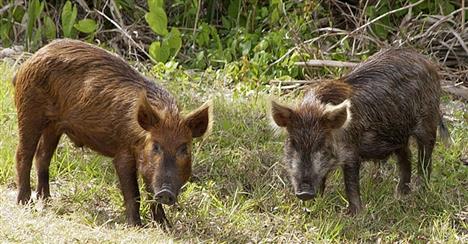USDA provides millions to stop feral hog growth in Arkansas
by November 26, 2019 8:57 am 3,751 views

Feral hogs have become a more significant problem in Arkansas during the last several years and now the federal government is providing funds to tackle the problem. The U.S. Department of Agriculture (USDA) announced it is awarding more than $3.4 million to fund pilot projects to control feral swine in the Natural State.
These projects are part of the Feral Swine Eradication and Control Pilot Program (FSCP) – a joint effort between USDA’s Natural Resources Conservation Service (NRCS) and Animal and Plant Health Inspection Service (APHIS) to help address the threat that feral swine pose to agriculture, ecosystems and human and animal health.
“Feral swine cause significant damage to crop and grazing lands, while also impacting the health of our natural resources,” said Arkansas NRCS State Conservationist Mike Sullivan. “By collaborating with our partners nationally and here in Arkansas, our hope is to control and eradicate this invasive species – improving operations for farmers while also protecting our natural resources for the future.”
NRCS and APHIS are working with Arkansas Agriculture Department’s Natural Resources Division and several partner organizations on four pilot projects in Arkansas to reduce the feral swine population, agronomic damage, and environmental impacts throughout the project areas.
NRCS, APHIS and the Arkansas State Technical Agriculture Committee worked together to define the critical areas to be considered for projects within the state. The Arkansas pilot projects are for three years in duration. Proposals were submitted to NRCS in August 2019 and a competitive process was used to evaluate each proposal for potential funding. The four agriculture department Natural Resources Division projects cover four regions of the state that have experienced excessive agricultural damage from feral swine.
NRCS is awarding more than $16.7 million this year for feral swine pilot projects in select areas of Alabama, Arkansas, Florida, Georgia, Louisiana, Mississippi, North Carolina, Oklahoma, South Carolina and Texas. The funding limit for a single award is $1.5 million. Awardees are required to provide at least 25% of the partnership agreement budget as a match to NRCS funding. APHIS is providing $23.3 million this year to the Wildlife Services programs located in the pilot projects’ states.
The 2018 Farm Bill provides $75 million for the Feral Swine Eradication and Control Pilot Program. These funds are for the life of the Farm Bill and divided evenly between NRCS and APHIS.
Arkansas Agriculture Secretary Wes Ward previously told Talk Business & Politics the state doesn’t know how many feral hogs are roaming the woods and crop lands across the state, but it’s growing and it’s becoming a serious problem.
These creatures have an estimated total national population between four and five million across 39 states. It is estimated feral hogs cause $1.5 billion annually in agricultural and ecological damage, USDA reported.
Feral hogs are not native to the United States. They are an invasive species, a public nuisance and a threat to Arkansas, according to the Arkansas Game and Fish Commission. They compete for food resources, destroy habitat by rooting and wallowing and will eat ground-nesting birds, eggs, fawns and young domestic livestock. They also carry up to 45 bacteria, diseases and parasites, including Trichinellosis, Brucellosis and swine herpes virus.
Hunting and shooting feral hogs has been implemented for the last few decades. It can chase feral hogs away from crops or food plots temporarily, but they return or become a problem for a neighboring landowner. Studies show at least 66% of a hog population must be removed each year just to prevent it from growing. Hunting has shown to reduce hog populations by up to 50%.
